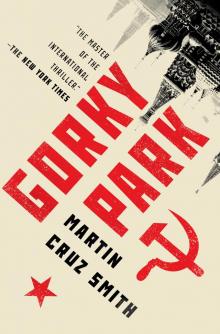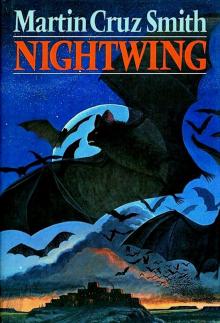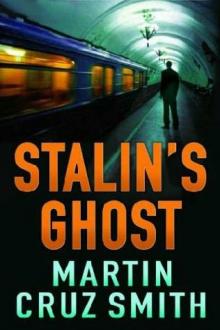- Home
- Martin Cruz Smith
Gypsy in Amber Page 2
Gypsy in Amber Read online
Page 2
‘Roman, did you know how many calories there are in goulash?’ she demanded.
Roman winced and relaxed slightly. He leaned on the secretary.
‘Thousands,’ she said, ‘literally thousands. If I had any, it would be dry toast for a month. That’s what they feed prisoners.’
‘Dany, it was your idea,’ Roman said. ‘You wanted to cook a real Hungarian dish.’
‘But goulash?’ the girl asked Isadore. ‘Have you ever seen those Hungarian girls? No wonder they all look like sausages. You never see French girls eating goulash.’
‘I don’t think my friend is interested in your peculiar view of nationalities,’ Roman told her.
‘A friend?’ The girl’s attitude changed from distress to pleasure. She seized Isadore’s hand. ‘I’m so glad to meet you. Roman never introduces me to any of his friends. He thinks they’ll disapprove,’ she said in a stage whisper. ‘I never would have thought you were a Gypsy.’
‘He’s not,’ Roman said. ‘Dany Murray, meet Sergeant Harry Isadore. He’s a policeman.’ Her attitude went back to distress. She retracted her hand.
‘I haven’t said anything wrong, have I?’ she asked Roman.
‘Nothing they can send me up for, unless there’s a law against consorting with gibbering clotheshorses.’
‘Maybe I’ll be going,’ she suggested.
Roman nodded. She kissed him quickly on the cheek and just as quickly wiped it off with her hand.
‘He hates lipstick,’ she told Isadore. On her way out the door she stopped long enough to say, ‘Poached eggs,’ and was gone before Roman could answer.
He rubbed his face and turned back to the policeman. He could see that Isadore had thought of something new.
‘Well, Sergeant, aren’t you going to arrest me?’
‘No. It’s just that there’s another gaja girl I want you to meet.’
Chapter Three
Sergeant Isadore inhaled and coughed. He was trying to give up cigarettes by smoking small cigars, but he kept forgetting. As he pounded himself on the chest, he wondered whether his son was going to keep his student deferment. Perhaps if he keeled over in Captain Frank’s office, they’d let Morris stay home as a hardship case. That was a hell of a price to pay to keep a son home.
‘You ought to give up smoking,’ Frank suggested balefully.
‘I know,’ Isadore said. He stubbed out the cigar in the stand-up ashtray the city provided.
‘Now tell me again. Is it Roman Grey or Romano Gry? Which one is the alias?’
‘Both,’ Isadore said. ‘I mean they’re both his real names. Gry is his name with other Gypsies. Grey is for gaja, non-Gypsies.’
‘This is a simple case, Sergeant. But I’m beginning to see what makes it complicated.’ Frank had the almost hairless head of a newborn bird, and it lolled from side to side as he spoke. ‘If I remember correctly, we’ve spoken about him before.’
‘He’s cooperated with the department before, Captain.’
‘Sergeant, I’d call donating some chairs for the Policemen’s Ball swell, but I wouldn’t call it cooperation.’
‘Yes,’ lsadore agreed. ‘Well, we don’t have enough information to make a charge stick. He can account for his whereabouts for the past four days, we can’t get any complaints from his customers, and actually we haven’t established any provable link between Pulneshti and Grey.’
Frank squinted at the one-by-two-inch photo of Grey stapled to his file. ‘Looks like some kind of mulatto to me.’
‘The Grys are famous for being dark,’ Isadore pointed out. ‘They’re Lovari Gypsies like Pulneshti. Grey has quite an interesting background. Orphaned and brought up by a judge in New York. That’s where he got the money to start his store.’
‘How about that? Can you tell me anything about the girl or Pulneshti? Something dull like the murder?’
Isadore swallowed a cough. ‘Nothing positive. The FBI can’t match her prints, and it takes some time to check all the runaways and missing persons. The lab tests verified no hard drugs, so we’re hitting the missing persons harder. Pulneshti has a record of grand and petty larceny, mostly cars, but we don’t have any record of next of kin.’
Frank snapped his middle finger on the Grey file. ‘No help here?’
‘No. He says he’s sure we’ll catch the guilty party.’
For a man whose avocation was sarcasm, Frank was not alert to the possibility in others. He merely grunted.
‘We’re trying to cut down the area of search,’ Isadore continued. ‘We sent a description of the car around the national wire, and we have a zoologist looking at it tomorrow to check out the bugs on the car and the radiator. That could help us determine where the car’s been, and it certainly looks as if it’s been everywhere.’
Frank’s face was starting to screw up with an inner pain.
‘It’s a little unorthodox, I know,’ Isadore said, ‘but it’s not like tracing an ordinary person. Gypsies don’t carry credit cards, they don’t stay at motels, they don’t have bank accounts, and they don’t talk to the police. Even when they do talk, it’s in their own language. None of the usual techniques work.’
Frank looked at Isadore for a long time. They’d started out in the Police Academy together, and Isadore had always gotten the better marks; he was the one who was expected to rise to inspector. Instead, Frank had followed orders, never hounded a case too long, always remembered St. Patrick’s Day, and now he was ahead by two grades and a few thousand dollars. Still, they had an understanding.
‘Harry, we’ve got to wrap this case up fast. It’s practically done for us. Pulneshti was probably the killer, and he’s dead. But the commissioner is resigning. The Irishman at the Central Investigation Department wants the job. So does the Jew at the Detective Bureau. The district attorneys and the captains are lining up with their boys, and I’ve got to jump soon. I thought I could lay low until this girl and the Gypsy came along in Jersey. Now someone transferred this homicide to you and me and don’t know who. It sounds like that college boy at the bureau, but CID is closer to the Jersey patrol. If you handle this right one of them is going to take the credit. Unless they expect you to blow it and then they can pin it on the other.’
‘Why don’t you call one of them and find out?’
‘The phone’s tapped, that’s why. I tried to get messages through, but they’re both traveling all over town with their flying squads. Do you understand? You have to wrap this up fast and neat, and if it means putting this other Gypsy in the can for a while, I’ll back you up. Until we find out who comes out on top.’
Frank pushed the files across the desk to Isadore.
‘You’re the man with the imagination, think up something,’ Frank said. ‘Anyway, from what you tell me, we’re dealing with born criminals.’
Chapter Four
On West Eighty-second Street above a bodega with a Puerto Rican flag flying over cans of papaya juice and bottles of saffron was an even more colorful window. It had a yellow hand with red lifelines dealing the ace of spades. Hanging out over the street was a sign with smaller versions of the symbols and the words ‘Madame Vera. Fortunes told in your hands, in the cards. Love or Career. What is Fate?’
Madame Vera had moved to the ofisa a month before. She and her family of twelve had driven over the Manhattan Bridge from their old ofisa on Flatbush Avenue in Brooklyn in two new but battered Chryslers. When they arrived at their new business address, the girls immediately unloaded a stack of folding chairs from the trunks. The men brought up tables, and the boys struggled up the stairs with gonyas. Each gonya consisted of a strap that went over the shoulders with enormous bags at each end. Inside was all the wealth of the family in heavy necklaces of American eagles, double eagles, old Mexican pesos even richer in gold, but mostly Austrian four ducats with the head of Emperor Franz Josef. As the tables and chairs were set up, the men strode up and down the stairs with bedrolls and the eiderdown quilts called dunbas.
While the
men relaxed with cigarettes, Vera and her sisters and daughters prepared the ofisa. They hammered nails into the walls, strung wires from the nails, and hung dark-red curtains from the wires so that in a matter of minutes the railroad flat was divided into living quarters and tearooms where the women could do their duikkerin, fortune-telling. Three crudely painted oilcloths were hung. One displayed a hand with the tracery of a map, another a buddha and a cross, and the third a phrenologist’s chart. Along the walls were tacked horoscope magazines and newspaper clippings on Django Reinhardt and Yul Brynner. Altogether, it took an hour to prepare the ofisa for its customers.
Customers demanded such a setting. They climbed the stairs anxious about dreams or curious about a number to play. Only a few asked about their future. Holding their hand, Vera would usually satisfy them with, if they were old, ‘a dispute over property that has caused great anguish’ or, if they were young, ‘your passions have been misunderstood and got you in great trouble.’ The different ones with real secrets could be read, too, though. The way they spoke, whether their eyes could stay with hers, the corner of a mouth were all letters in an alphabet that merely needed to be put into words and then sentences.
The family would stay in the ofisa until Vera made her bozur. Vera would know the victim as soon as she entered, a woman alone whose children visited once a month, just like the last one in Brooklyn. Vera had spent more time than usual in sympathetic conversation before abruptly asking whether this woman suffered from peculiar pains lately. Like all the victims, she agreed eagerly. Vera examined her palm carefully and saw ‘something bad.’ She sent the woman home and told her to sleep naked under her three warmest blankets holding an egg over her belly. The next day the woman returned with the egg wrapped in a napkin. Vera broke the egg open and lying in the yolk was a tiny hideous head with human hair grinning up at them. The devil’s head was proof of the evil – possibly cancer – growing inside her. It was the sign of a curse.
The root of the curse was the money in the woman’s savings account. Vera explained that at some time it had passed through the hands of a murderer and the evil would only stop growing when she had taken the curse off. She wanted no payment for herself; this was too important a matter. As a test, she told the woman to draw a ten-dollar bill from her account and bring it to her with another egg in a napkin.
When the woman came back, she tried to give the bill to Vera, but the Gypsy refused to touch it. She asked the woman to place the napkin in a corner of the ofisa. They waited an hour, and when they broke the egg, looking up at them was another ugly devil’s head. There was no longer any doubt about the curse.
Vera told the woman what was necessary. The next day she went to her bank and drew out every cent in her savings account in large denominations, fifties and hundreds, ‘so that it will fit in the little bag,’ as Vera put it. The Romani word for the little bag of money was bozur, and Vera would have to hold it when she took the curse off.
The woman tied up the bozur herself. While she gaped, Vera began talking to the bag and to the special spirits she was in contact with. Soon the talking turned to pleading, the English turned to Romani and then to complete unintelligibility as the Gypsy collapsed on the floor, rolling her eyes and moaning under the force of the bozur. She ripped her blouse and scratched her face. As she yielded a particularly eerie howl of agony, her hands slipped the bag into her several thicknesses of petticoats and a second, absolutely similar bag appeared. At last, Vera passed out on the floor.
When she was revived, she had bad news for the woman. The curse could be drawn off, but only if the money were destroyed. When the woman hesitated, the Gypsy pointed to the devil’s head that leered at them from a glass case. Vera had the bucket and coals ready when the woman gave in. The victim threw the bozur in herself, a phony bozur with paper cut in the shape of bills, and the two women knelt and prayed as the flames shot up. Finally, Vera told the woman that she was saved but only on the condition that she never tell anyone how.
Of course, the following day the bank manager called the woman’s sons, and they got the full story from her but by then Madame Vera and her family had moved their gonyas and dunhas into a new ofisa.
Today, however, a prospective victim would have been disappointed. For once, fate had cheated Madame Vera.
‘Nanoosh, te aves yertime mander, te yertil tut o Del,’ Roman said. He was in the center of the long ofisa. Dark curls hung over his face, and his suit was torn and damp with sweat.
‘Nanoosh, if you will forgive me all I have done to you, I will forgive all you have done to me.’ The chorus came from the figures huddled along the walls of red burlap.
‘Te avel angla tute, Nanoosh, kodo khabe tai kado pimo tai mange pe sastimaste,’ Vera Pulneshti said. Tears ran over the deep lacerations on her cheeks.
‘Nanoosh, if you will forgive me all I have done to you, I will forgive all you have done to me,’ the family repeated. In a small pile in the center of the room was whatever jewelry they had been wearing when they heard of Nanoosh’s death. Roman’s cuff links were mixed with earrings and necklaces. In the gloom, they reflected the votive candles lit on a small altar that carried a photo of Nanoosh and a miniature figure of a Black Virgin.
One of the children, a girl with a mat complexion, passed around a tray of tea sweetened with strawberry jam. It would be all the Pulneshtis were allowed to eat until after the burial. Roman took a glass, holding it with his thumb on the rim and his forefinger on the bottom. Vera refused a glass for herself and held onto Roman’s arm.
‘He was such a good man. You remember how you respected him. Everyone respected him,’ she said hoarsely. It wasn’t exactly true. Nanoosh was a gambler, good at the races but bad at cards, and he owed everybody. But he was great fun at a party, and he played the guitar like a Gitano, and it was his sister’s duty to see him praised.
‘Those things I said to Nanoosh the last time you were here? That was love talking, you understand. And now he’s dead.’
When Roman tried to comfort her, she pushed him away. She waddled ferociously to the makeshift altar and snatched the picture to bring back to Roman. It was a Polaroid snapshot of Nanoosh sitting on the fender of a limousine.
‘He was a great Rom,’ Roman said soothingly. The other men in the room grunted agreement.
‘Is this the face of a murderer?’ Vera asked. ‘Can this man have killed some stupid gaji and cut her into pieces? No! Are you going to tell me that, Romano Gry?’
‘I didn’t,’ Roman said. ‘The police are fools, but they’ll find out that Nanoosh had nothing to do with it.’ He believed what he said, Isadore was like all gaja, collectors hoarding pieces of a style or a crime. Sooner or later, it would become obvious that Nanoosh was a piece that didn’t fit. Whether Isadore found out who did commit the crime, he didn’t care.
‘Then why did they come to you?’ Vera asked, advancing on him. With her eyes burning between the tangle of her hair and the red stripes on her cheeks, she was undeniably formidable.
‘You know how they are. They wanted to know where Nanoosh was going and they thought I could help them.’
Vera’s heavily sagging front had Roman’s back against a window. He had heard that not even the most skeptical client left her ofisa without a twenty-dollar scare.
‘Ah! Then they thought you could help,’ she said.
‘He was bringing some things to me, you know.’ He looked around to see if one of the men would pull Vera off him. There wasn’t a chance; she had the whole family cowed. Her son Tibo in the corner could lift a small car to remove its transmission. Around his mother he was a mouse. Even the Welfare Department paid Vera just to keep her out of the office.
‘Look, I’ve fixed it so that you can pick up Nanoosh and give him a decent burial,’ Roman told her.
‘A decent burial!’ she shrieked. Vera turned to the rest of the room so that everyone could appreciate her histrionics equally. ‘Listen to Romano. A decent burial! My brother is called a murder
er, and this man says he will have a decent burial!’ She spat on the floor. ‘You live like the gaja so much that you’re turning into one. What about Nanoosh’s mulo? What about tonight when his spirit walks around that cold morgue knowing that the shame of a murder is on him?’
There was nothing ridiculous in what she was saying. Nanoosh’s spirit was freed from his body, dead but not gone, a mulo. The gaja might despise the Romany, but no Rom ever forgot his dead. For him, roaming over the earth were not only the half million Gypsies who drew breath but also the countless Gypsies who had gone before, restless spirits still wandering through cities and deserts, still real. In the dark room hung with Vera’s maroon curtains this was a fact.
All the same, Roman suppressed a smile. Vera was flaunting her dramatic talents. She shuddered, displaying her strong profile. Her large hook nose was almost as fine as Roman’s.
‘Nanoosh made only one mistake,’ she announced. ‘He thought that Romano was a true Rom, a phral. Perhaps it’s better he never knew that he was wrong. As you all know, a Gypsy girl is not good enough for this man here. He doesn’t dress like a Gypsy or eat like one or smell like one to me. We are not worth his bother. He’s changed. I’m sorry, Nanoosh, forgive me for telling you.’
Roman sighed. ‘Okay, Vera, what are you after? Just tell me.’
The fortune-teller let her bosom stop heaving and wiped a tear from her eye. ‘I only want you to help the mulo of your friend. Nanoosh can never reach paradise with the taint of murder on his name. The police asked you to help. I think they’re right, the ignorant bastards. You do that. You prove that Nanoosh was an honest man, that he didn’t kill anybody.’
Roman didn’t see how he could ever prove Nanoosh was honest, but he said, ‘I’ll see what I can do.’
‘That’s better,’ Vera said. On cue, one of her daughters came out of the shadows with a paper plate. On it was a pastry dripping with pistachio and honey. ‘We can’t eat until the pomana,’ she said, ‘but you should. You have a lot of work to do.’

 Polar Star
Polar Star Red Square
Red Square Three Stations
Three Stations Wolves Eat Dogs
Wolves Eat Dogs Gorky Park
Gorky Park December 6
December 6 Havana Bay
Havana Bay Tatiana
Tatiana The Girl From Venice
The Girl From Venice Stalin's Ghost
Stalin's Ghost Nightwing
Nightwing Stalin s Ghost
Stalin s Ghost Gypsy in Amber
Gypsy in Amber Rose
Rose Three Stations: An Arkady Renko Novel
Three Stations: An Arkady Renko Novel The Siberian Dilemma
The Siberian Dilemma December 6 (V5.0)
December 6 (V5.0) Three Stations ar-7
Three Stations ar-7 Stalin’s Ghost ar-6
Stalin’s Ghost ar-6 Havana Bay ar-4
Havana Bay ar-4 Tatiana ar-8
Tatiana ar-8